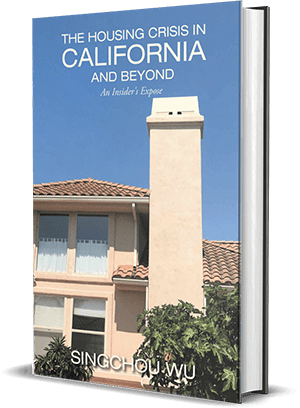I came to the US in 1962 from Taiwan. To me, America was the land of opportunity. I started working the next day, and got paid $1 an hour. Nobody told me that federal minimum wage was $1.15 an hour. It didn’t matter to me, because after just over a year, I had saved enough to go to graduate school. After five years, I got a Master of Science Degree and a Ph.D. in Statistics and a teaching job at California Polytechnic State University. I bought my first house in October 1972 in the town of San Luis Obispo. To an immigrant like me, this was an important milestone: I realized my American Dream. I was about the last one among my friends to become a homeowner. One of my friends started a minimum wage job in LA about the same as I did. He saved a few hundred dollars after a year, and he was qualified to buy a house under construction in Orange County. A year later, he was the proud owner of a brand-new house.
But in the last few decades, America has changed, most of the changes are for the better. But unfortunately, not everything has changed for the better. Can a minimum wage worker afford to live in San Francisco? Can a minimum wage worker in California qualify to buy a house with two years’ saving? Could I repeat the feat if I start my new life in California today? It appears that America is no longer the land of opportunity that I used to know! So, what has happened? Why don’t we see anyone protesting against the missing “land of opportunity”? Why don’t we hear discussions about the missing “land of opportunity”? Don’t we miss it? I do! I like to see people living close to their jobs. I like to see every native-born American having the same opportunities that an immigrant had about 50 years ago—a minimum wage worker could be the proud owner of a brand-new house in two years.
The high cost of housing problem is a local issue, so it hasn’t had enough attention. There has been little discussion of the cause, the consequences or the solutions for the crisis. This book calls for more focus at the state or national level on the problem of high housing costs in California and beyond. This book also explains the cause of the problem, shows the consequences of the problem, and presents solutions to the problem.
I dedicate this book to two excellent public servants in the City of San Luis Obispo, Mr. Nick Nicolas, a career building inspector, and Dr. Allen Settle, ex-Mayor of San Luis Obispo. Without Mr. Nicolas’ guidance and help, I could never have learned much about nuts and bolts of housing construction. He demonstrated what it meant to be a superb public servant and he put some of his colleagues to shame. Dr. and Mayor Settle educated me about the essence of local control of land-use and he went out of his way to help me, an ethnic minority, against institutionalized discrimination and prejudice at the expense of his own political career.
I also like to thank my good friend Dr. George Tao for his encouragement. He and I attended the same high school and university in Taipei. We didn’t know each other back then, because George is a few years of my senior. We meet on an internet forum and we are at the different ends of polarized thoughts about politics and current issues. But we agree on at least one issue. When he asked why the housing costs in some places in the US were so ridiculously high and why there were so many homeless people, I offered a few answers to his questions. He congratulated me for a rather thorough and in-depth understanding of the problem. His compliment propelled me to write this book.
I would also like to thank my long-time friend, Dr. George Hsi, an excellent engineer. During the process of learning about the housing construction, I encountered numerous questions about various building codes. He answered some of the questions right away, any questions that he couldn’t answer, he always got the right answers for me soon. I would like to thank Mayor Lynn Cooper, Councilman Munger and Councilman Bond for their understanding and support in 1981. They voted to reverse the Architectural Review Commission 0-7 vote against the approval of one of my building projects. They made me a lifetime believer of Conservatism.
Read the free book preview
